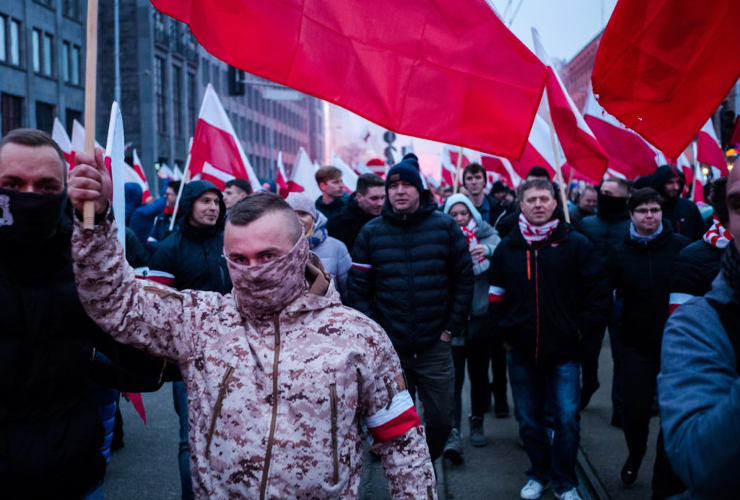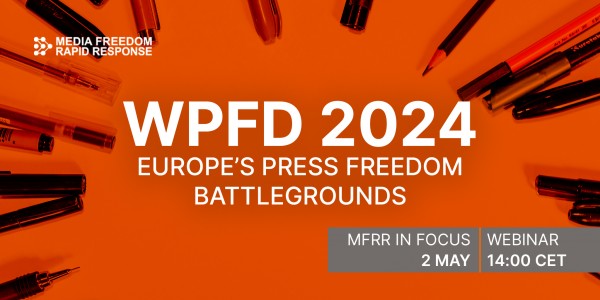What forces are behind the rise of right-wing paramilitary groups in Central and Eastern Europe? How are they funded and what are the links between them? How are they shifting understandings of what it means to be patriotic?
These are some of the questions that the team of investigative journalists at VSquare sought to answer in a series of articles published this year on “Patriotism militarized” in the Central European Visegrád countries of Poland, Hungary, the Czech Republic and Slovakia.
“This is an overlooked, but very important, trend that says a lot about social changes in the region”, Wojciech Cieśla, head of Fundacja Reporterów, told the International Press Institute (IPI) during a recent interview in Warsaw. “We noticed it and decided to check what it looks like in different countries.”
In this project, he said, the idea was to compare this trend across the four countries, which are often referred to collectively as the Visegrád Group, but which differ in significant ways.
“At the political level, Poland and Hungary are very similar, but when it comes to the level of militarization and historical policy, they are very different”, he said.
For the investigation, Fundacja Reporterów teamed up with journalists at Direkt36.hu and Atlatszo.hu in Hungary, the Czech Centre of Investigative Journalism and Aktuality.sk in Slovakia. The project was supported with an 11,000 euro grant from IJ4EU, a fund backed by the European Commission via the European Centre for Press and Media Freedom (ECPMF) and managed by IPI. IJ4EU, which launched in 2018, aims to support cross-border investigative journalism in Europe.
A Visegrád perspective
For the project, VSquare brought together around ten journalists from the four countries. They exchanged ideas over Slack or, for more sensitive information, Signal, supplemented by meetings in one of the countries every two or three months.
“We got together because our countries neighbour one other and are strongly linked; economically and politically, with Poland following in Hungary’s footsteps”, he said, referring to the changes in his country since the right-wing Law and Justice (PiS) party came to power in 2015.
Working on the project created a support network of investigative journalists across the region, Cieśla noted.
“We journalists need to stick together. The time always comes when you need to grab the phone because something is happening and you need to check something”, he said. “I know that we can rely on each other,” he added, referring to the journalistic contacts he has made across the region within and through VSquare.
For Cieśla, the cross-regional perspective also offered an insight into the pressures investigative journalists in other the countries face.
“I know that journalists are having a tough time in Hungary and definitely don’t want that to be repeated in Poland”, he said. “The Slovaks were taught a lesson by the murder of Ján Kuciak; they learnt that the authorities know how to play with murderers.”
The team started by gathering information on the paramilitary groups operating in the four countries. They examined states’ budgets for these types of initiatives, including how many groups get funding, what kind of amounts and how they are linked to the countries’ Ministry of Defense.
Their investigation indicates that the countries are supporting amateur militarists on an unprecedented scale. Money is going to organizations that do not always have much to do with defence, but may be close to the national authorities, Cieśla noted.
Journalists from the group also travelled to meet the Slovenskí Branci, an unofficial paramilitary group in Slovakia, and to watch Polish paramilitary groups training.
After a series of blog posts over the course of the winter, the team published a series of articles in January 2019 on topics ranging from a militarized youth camp in Slovakia to patriotic clothing in Poland.
The investigation highlighted differences between the countries. In Poland, the militarization of patriotism is very strong, as it is in Slovakia in some ways, too. In the Czech Republic, it is confined to the army level, Cieśla explained.
Meanwhile, in Hungary, the focus is more historical, with re-enactment groups that use replicas 16th-century costumes and weapons.
What is patriotism?
Cieśla said the project raises broader questions about what it means to be a patriot in the four Visegrád countries today, in the context of the political changes in the region.
“In Poland since 2015, there has been a kind of conservative revolution. There has been an étatisation of patriotism, inscribed in PiS’s historical policy and militarism”, he said.
“The authorities are pushing us into a narrow framework of ‘patriotism is this’,” he said. This sends children the message that “one is most patriotic when one puts on a uniform and does a bit of shooting in a field”, rather than through other activities, such as writing neatly or getting good grades.
Although the renewed emphasis on the military in Poland in recent years is partly a response to the fragile security situation in neighbouring Ukraine, Cieśla stresses that it can be used domestically.
“This whole narrative creates a social mood in which the nation agrees more easily to all sorts of drastic changes. When you command an army, you issue orders. Militarization seeks to create obedient cadres and maintain discipline”, he explained.
The articles were published in English on VSquare’s website and by team members’ media organizations in their national languages.
“If [our investigation] can warn or alert people somehow, then it has fulfilled its role”, Cieśla observed. “We said: patriotism yes, but there are different ways of showing patriotism, and this is not one that suits me.”
“The biggest challenge that we face with these kinds of subjects is that they may be left unsaid or go unnoticed after publication; that nobody will react to them,” he added.
For example, one of the articles they published looked at how lobbyists and paramilitary organizations in Poland are pushing for wider access to arms. There was no official reaction from Polish lawmakers or from the Ministry of Defense.
While the investigation’s impact on public debate has been limited, Cieśla stressed that it fulfilled another important function by chronicling an overlooked phenomenon.
“VSquare’s articles shed light on a certain problem that the public debate will eventually return to”, he said. “If anyone is ever studying the militarization of patriotism in the future, especially in English, they will find our articles. We will never be a news portal, but if decision-makers read us, then that is enough of an audience”, he added.
Democracies need investigative journalism
For Cieśla, investigative journalism is key to strengthening and preserving civil society in Central and Eastern Europe.
“Investigative journalism is of fundamental importance for democracy. Without it, we will be deaf and blind as citizens”, he said.
“We have the instruments and are paid to seek out difficult, unobvious stories that say something about this reality that we live in”, he added, referring to investigative journalists like the team at VSquare.
Yet publications in Poland are increasingly unable to afford this kind of stories, which are written over weeks or months, he stressed, quoting a friend who likens the situation to a melting iceberg where there is little space left above water. While many journalists his age have moved into other fields, such as PR, the next generation of investigative reporters is only just being trained, he noted.
One of the exceptions in Poland is privately-owned television news channel TVN24, with its investigative program Superwizjer, along with young fact-checking platform OKO.press, he said. He also mentioned the new Investigative Centre of Ján Kuciak (ICJK) in Slovakia, named after the journalist who was murdered in February 2018.
Cieśla would like to build a centre for investigative journalism in Warsaw.
“We as Fundacja Reporterów, we as VSquare, need to do everything to create such a place. We are at the start of the road, especially when it comes to Poland”, he said.
However, as with investigation journalism more generally, funding remains an obstacle.
“It would be amazing to open this investigative journalism centre and invite people to work with us, but we lack the funds”, he said.
Cieśla sees little hope for funding from within Poland, citing a lack of culture in the country for donating to media organizations. He would also hesitate to take money from certain wealthy individuals, as that could eventually lead to a conflict of interest when writing about their business interests.
With foreign funding, he noted that part of the problem is that donors regard Poland as a developed country, regardless of PiS’s changes over the past three years, including to the judiciary, which EU officials have warned undermine the rule of law.
“Grants, like this one from IPI, help considerably as they allow us to breath and work on a great topic from a reporter’s perspective”, he said.



